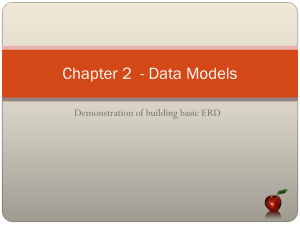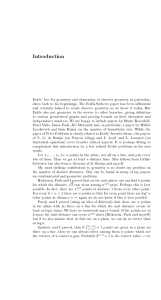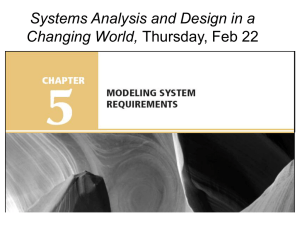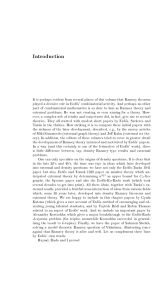We do not have much to add here. We only... Arthur Stone, Cedric Smith, William Tutte and Irving Kaplansky for...
advertisement
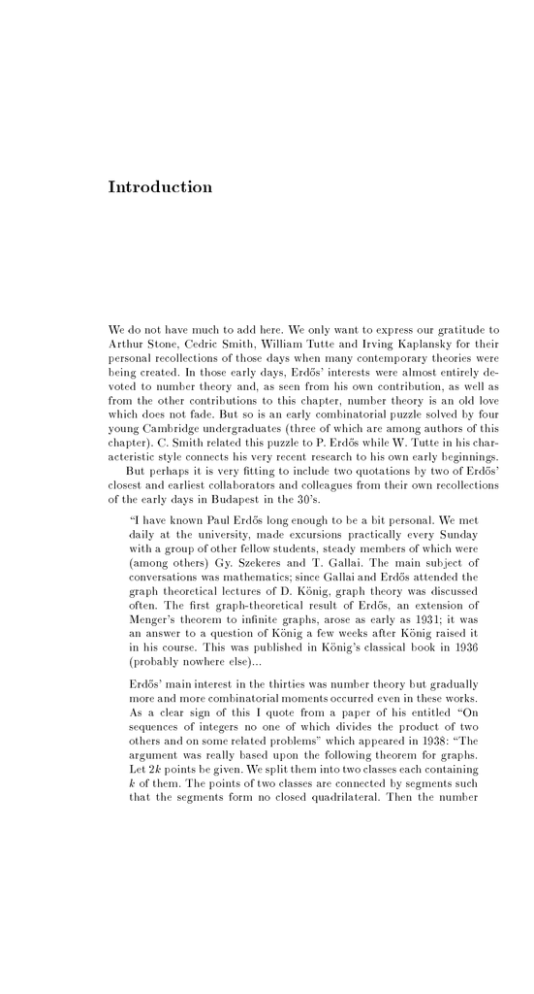
Introduction We do not have much to add here. We only want to express our gratitude to Arthur Stone, Cedric Smith, William Tutte and Irving Kaplansky for their personal recollections of those days when many contemporary theories were being created. In those early days, Erd}os' interests were almost entirely devoted to number theory and, as seen from his own contribution, as well as from the other contributions to this chapter, number theory is an old love which does not fade. But so is an early combinatorial puzzle solved by four young Cambridge undergraduates (three of which are among authors of this chapter). C. Smith related this puzzle to P. Erd}os while W. Tutte in his characteristic style connects his very recent research to his own early beginnings. But perhaps it is very tting to include two quotations by two of Erd}os' closest and earliest collaborators and colleagues from their own recollections of the early days in Budapest in the 30's. \I have known Paul Erd}os long enough to be a bit personal. We met daily at the university, made excursions practically every Sunday with a group of other fellow students, steady members of which were (among others) Gy. Szekeres and T. Gallai. The main subject of conversations was mathematics; since Gallai and Erd}os attended the graph theoretical lectures of D. Konig, graph theory was discussed often. The rst graph-theoretical result of Erd}os, an extension of Menger's theorem to innite graphs, arose as early as 1931; it was an answer to a question of Konig a few weeks after Konig raised it in his course. This was published in Konig's classical book in 1936 (probably nowhere else)... Erd}os' main interest in the thirties was number theory but gradually more and more combinatorial moments occurred even in these works. As a clear sign of this I quote from a paper of his entitled \On sequences of integers no one of which divides the product of two others and on some related problems" which appeared in 1938: \The argument was really based upon the following theorem for graphs. Let 2k points be given. We split them into two classes each containing k of them. The points of two classes are connected by segments such that the segments form no closed quadrilateral. Then the number 46 of segments is less than 3k3=2." No doubt he was not far from the discovery of extremal graph theory before 1938." P. Turan (Art of Counting, p. xvii) \We had a very close circle of young mathematicians,foremost among them Erd}os, Turan and Gallai; friendships were forged which became the most lasting that I have ever known and which outlived the upheavals of the thirties, a vicious world war and our scattering to the four corners of the world. I myself was an \outsider," studying chemical engineering at the Technical University, but often joined the mathematicians at weekend excursions in the charming hill country around Budapest and (in summer) at open air meetings on the benches of the city park. Paul, then still a young student but already with a few victories in his bag, was always full of problems and his sayings were already a legend. He used to address us in the same fashion as we would sign our names under an article and this habit became universal among us; even today I often call old members of the circle by a distortion of their initials. \Szekeres Gy., open up your wise mind." This was Paul's customary invitation | or was it an order? | to listen to a proof or a problem of his. Our discussions centered around mathematics, personal gossip, and politics. It was the beginning of a desperate era in Europe. Most of us in the circle belonged to that singular ethnic group of European society which drew its cultural heritage from Heinrich Heine and Gustav Mahler, Karl Marx and Cantor, Einstein and Freud, later to become the principal target of Hitler's fury." G. Szekeres (Art of Computing, p. xix, xx) And we are happy to include here a standard Erd}os article of those days. Well slightly nonstandard this time: My favorite problems from all elds...
